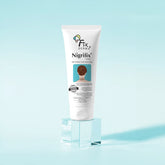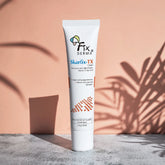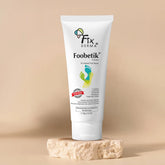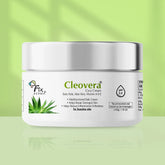Sensitive Skin

Reasons Behind This
Genetics
Some people are born with a thinner or more delicate skin barrier, which can make the skin more prone to irritation and environmental aggressors.
Environmental Factors
Pollution, UV rays, extreme weather (cold, heat, or wind), and air conditioning can strip moisture from the skin, making it more vulnerable to irritation and sensitivity.
Skincare Products
Harsh ingredients like alcohol, sulfates, and strong fragrances can disrupt the skin's natural barrier, leading to redness, itching, and inflammation in those with sensitive skin.
Hormonal Changes
Fluctuations in hormones, especially during pregnancy, menopause, or stress, can make the skin more sensitive and reactive.

How To Prevent Sensitive Skin?
Choose Gentle Products
Opt for fragrance-free, hypoallergenic skincare and makeup products. Look for labels that specify "sensitive skin" formulations.
Patch Test New Products
Before applying new products to your face, do a patch test on a small area of skin to check for reactions.
Moisturize Regularly
Use a gentle, hydrating moisturizer daily to maintain the skin's barrier and prevent dryness.
Consult a Dermatologist
If you experience persistent sensitivity or skin reactions, consult a dermatologist for personalized advice and treatment options.

Risk Factors
Dryness and Flakiness
Many individuals with sensitive skin experience dryness, leading to rough, flaky patches.
Itching and Burning
Increased sensitivity can cause persistent itching or a burning sensation, making it difficult to find relief.
Rash Formation
Sensitive skin is more prone to developing rashes, which can vary in severity and may require medical treatment.
Increased Reactivity
Individuals may notice that their skin reacts adversely to certain products or environmental factors, leading to breakouts or other skin issues.

Tips From An Expert's Desk!
Identify Triggers
Keep a diary to track products and environmental factors that irritate your skin. This can help you avoid specific triggers.
Limit Exfoliation
Avoid harsh scrubs or chemical exfoliants that can strip the skin of its natural oils. Opt for gentle exfoliation methods, such as enzyme-based products.
Be Mindful of Temperature Changes
Avoid extreme temperatures, both hot and cold, as they can exacerbate sensitivity. Use lukewarm water for cleansing.
Avoid Hot Showers
Hot water can strip the skin of moisture. Opt for lukewarm water and limit shower time.
FAQs
1- What causes sensitive skin?
Sensitive skin can be caused by various factors, including environmental triggers, genetics, skin conditions (like eczema or rosacea), allergies, and harsh skincare products.
2- How can I identify if I have sensitive skin?
You may have sensitive skin if you experience redness, itching, burning, or dryness after using certain products or exposure to environmental factors.
3- What are the best products for sensitive skin?
4- What is the main ingredient in the Cleovera Cream for Sensitive Skin?
The Cleovera Cream is formulated with 10% Aloe Vera, along with 0.2% Vitamin E and 0.4% Vitamin A, which help soothe and hydrate
sensitive skin.
5- Is the Repair and Restore Face Serum suitable for all skin types?
6- Can I use Cleovera Cica Cream on acne-prone skin?
7- What are the benefits of using a serum for sensitive skin?
Serums like the
Repair and Restore Face Serum provide concentrated active ingredients that help repair and hydrate the skin, promoting a healthier and more balanced complexion.
8- How often should I apply the Cleovera Cream?
You can apply Cleovera Cream twice daily, in the morning and evening, for optimal hydration and soothing effects.
9- Is the Shadow Sunscreen suitable for sensitive skin?
Yes, the Shadow Sunscreen for
Oily Skin SPF 50+ Gel is formulated to be non-irritating and is suitable for sensitive skin types.
10- What are the key ingredients in the Age Reverse Serum?
Yes, you can safely layer multiple products, such as the Cleovera Cream followed by the
Repair and Restore Face Serum for enhanced hydration and protection.
12- Are Fixderma products tested on animals?
No, Fixderma is committed to cruelty-free practices and does not test its products on animals.
13- How can I incorporate Fixderma products into my skincare routine?
Start with a gentle cleanser, apply the Cleovera Cream, follow with the
Repair and Restore Face Serum, and finish with the Shadow Sunscreen in the morning.
14- Will the Age Reverse Serum help with fine lines?
Yes, the Age Reverse Serum is formulated to hydrate the skin and improve elasticity, helping to reduce the appearance of fine lines and wrinkles.
15- Can I use these products if I have eczema or rosacea?
Many individuals with eczema or rosacea find relief using Fixderma’s sensitive skin products, but it’s always best to consult with a dermatologist before trying new products.
16- Are there any preservatives in Fixderma sensitive skin products?
Fixderma formulates its products with minimal preservatives to reduce the risk of irritation, focusing on soothing and natural ingredients.
17- What should I do if I experience irritation from a product?
If you experience irritation, discontinue use immediately and consult a dermatologist for personalized advice.
18- How long does it take to see results from the Repair and Restore Face Serum?
Many users see improvements in skin texture and hydration within a few weeks of consistent use, but results can vary depending on individual skin types.
19- Is it safe to use these products during pregnancy?
While many Fixderma products are gentle and safe, it’s recommended to consult with a healthcare provider before using any new skincare products during pregnancy.
20- Where can I purchase Fixderma products for sensitive skin?
Fixderma Skincare for Sensitive Skin: Gentle Solutions for Delicate Skin
At Fixderma, we understand that sensitive skin requires extra care. Our specially curated collection of sensitive skin skincare products is designed to soothe, protect, and nourish, while keeping your skin's needs at the forefront. Whether you're dealing with redness, irritation, dryness, or inflammation, our gentle formulations provide the ideal solution to enhance your skincare routine without causing discomfort.
Why Choose Fixderma Skincare for Sensitive Skin?
Sensitive skin is delicate and prone to irritation, making it important to choose skincare products that are soothing and non-irritating. Fixderma’s sensitive skin collection is crafted with natural, dermatologist-tested ingredients that nourish and hydrate without compromising your skin’s health.
-
Gentle & Soothing Formulas: Each product is designed to calm and alleviate irritation, offering hydration and comfort.
-
Free from Harsh Chemicals: Our products are free from parabens, sulfates, alcohol, and artificial fragrances, ensuring no harsh ingredients are introduced to your sensitive skin.
-
Dermatologist-Approved: Clinically tested to provide safe, effective skincare for sensitive skin, our collection ensures you get the best without any risks.
Benefits of Using Fixderma Skincare for Sensitive Skin
-
Hydration & Moisture Retention: Sensitive skin often struggles with dehydration. Fixderma’s skincare products are enriched with moisturizing ingredients like hyaluronic acid and glycerin to lock in moisture and keep your skin soft, smooth, and hydrated.
-
Calms Redness & Irritation: Say goodbye to inflammation and redness with soothing ingredients such as aloe vera, chamomile, and green tea that help to calm and reduce irritation.
-
Protects from Environmental Stressors: Our products form a protective barrier against harmful environmental factors like pollution and harsh weather conditions, preventing skin damage and irritation.
-
Improves Skin Texture: Our sensitive skin products not only soothe but also improve the texture of your skin, leaving it smooth, radiant, and feeling refreshed with every use.
Key Ingredients in Fixderma Sensitive Skin Products
-
Aloe Vera: Known for its anti-inflammatory properties, aloe vera soothes and hydrates irritated skin while providing relief from redness and discomfort.
-
Hyaluronic Acid: This powerful humectant attracts moisture to the skin, ensuring deep hydration while leaving your skin soft and plump.
-
Green Tea Extract: Rich in antioxidants, green tea helps protect sensitive skin from environmental damage and calms any inflammation or irritation.
-
Chamomile Extract: Chamomile is renowned for its soothing properties, making it perfect for calming sensitive skin and reducing inflammation.
How to Choose the Best Fixderma Products for Sensitive Skin
When selecting skincare for sensitive skin, it’s important to choose products that are gentle yet effective. Here are some tips to help you pick the right Fixderma products for your skin type:
-
Identify Your Skin’s Needs: Determine if your skin is dry, oily, combination, or prone to redness and irritation. This will help you pick products that address your specific concerns.
-
Look for Non-Irritating Ingredients: Always choose products with calming ingredients like aloe vera, chamomile, and hyaluronic acid to minimize irritation.
-
Patch Test New Products: Before incorporating a new product into your routine, do a patch test to ensure it works well with your skin and doesn’t cause any adverse reactions.
Fixderma Sensitive Skin Skincare Routine
-
Gentle Cleanser: Start your skincare routine with a mild, fragrance-free cleanser that removes impurities without stripping your skin’s natural moisture.
-
Soothing Serum: Use a calming serum that targets inflammation and provides deep hydration to your sensitive skin.
-
Moisturizer: Finish with a lightweight moisturizer that locks in hydration and forms a protective barrier against external aggressors.
-
Sunscreen: Always use a sunscreen with broad-spectrum protection to shield your sensitive skin from harmful UV rays.
Why Fixderma Is Your Ideal Choice for Sensitive Skin
At Fixderma, we are committed to offering skincare solutions that are not only effective but also safe for sensitive skin. With our dermatologically-tested formulas, you can trust that you’re giving your skin the care it deserves. Our products are designed to enhance your skin’s natural beauty without causing irritation or discomfort.
Shop Fixderma Sensitive Skin Collection Today
Explore our complete range of gentle skincare products for sensitive skin, including cleansers, moisturizers, serums, and sunscreens. Whether you’re looking to calm redness, hydrate, or protect your skin, our products are the perfect solution for maintaining a healthy, glowing complexion.
Shop now and experience skincare that cares for your skin as much as you do!


































